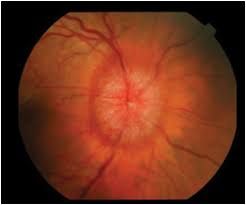Papilloedema is a medical condition characterized by swelling of the optic disc, which is the point on the retina where the optic nerve fibers exit the eye. This swelling is usually caused by increased intracranial pressure (ICP).
Causes
1. _Increased intracranial pressure_: Conditions like brain tumors, meningitis, or idiopathic intracranial hypertension can cause papilloedema.
2. _Head trauma_: Severe head injuries can lead to increased ICP and papilloedema.
Symptoms
1. _Visual disturbances_: Transient vision loss, double vision, or blind spots.
2. _Headaches_: Often worse in the morning.
3. _Nausea and vomiting_: May occur due to increased ICP.
Complications
1. _Vision loss_: Untreated papilloedema can lead to permanent vision loss.
2. _Optic nerve damage_: Prolonged swelling can damage the optic nerve.
Diagnosis
1. _Ophthalmoscopy_: Examination of the optic disc to detect swelling.
2. _Imaging tests_: MRI or CT scans to identify underlying causes.
Treatment
1. _Addressing underlying cause_: Treating the underlying condition causing increased ICP.
2. _Monitoring_: Regular eye exams to track optic disc swelling and vision.
If you’re experiencing symptoms or concerns, consult an eye care professional or a healthcare provider for proper evaluation and guidance.
